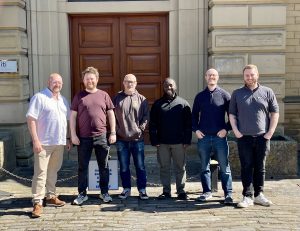Yorkshire location chosen for new rural broadband trial

Some of the fastest and most reliable broadband in the UK is heading to West Yorkshire, after a village was named as one of 13 rural communities to benefit from a broadband trial.
Openreach engineers will be working in Flockton to test a range of new tools and techniques as they install the latest ‘full’ fibre-to-the-premises (FTTP) broadband.
In some areas the first homes and businesses could order FTTP in time for Christmas, with work continuing during 2020. Once services are live, people living and working in Flockton will have access to download speeds of up to 1 gigabit per second (1Gbps) – about 18 times faster than the current UK average.
It is hoped the pilot will pave the way for a much bigger upgrade of rural homes and businesses in smaller, less accessible remote locations.
Kim Mears, Openreach’s managing director for infrastructure, said: “This is a really important trial for Openreach and it’s great that West Yorkshire is set to play a leading role.
“We understand the importance of bringing great connectivity to rural communities, and as well as providing fantastic broadband for people living in Flockton, we hope this provides us with the platform to extend our reach to hundreds of thousands more rural premises in the coming years.
“We have already done a lot in West Yorkshire, through our partnership with the five West Yorkshire local authorities and the West Yorkshire Combined Authority by joining forces with a number of communities who’ve asked to work directly with us. But we know there is more to do and we can’t wait to get started.”
The trial is part of Openreach’s ambition to extend its FTTP network into areas that were considered more difficult or expensive for the private sector to upgrade commercially.
Openreach engineers are testing a number of innovative tools – that enable work to be done faster and at less cost – including a specialised trench digging tool called a diamond cutter. It is a giant rotating circular blade with diamonds embedded in the metal coating on its edge – enabling it to slice through pavements and roads leaving a neat channel into which the machine simultaneously feeds in tubing for fibre-optic cables.
The specialist kit is capable of installing 700 metres of cabling a day – more than 20 times that by a standard two-person civils team using traditional methods of drilling and excavation.
The company is also trialling ‘remote nodes’ – where fibre-optic cables can be built out from specially-adapted existing green roadside cabinets.
Specialised broadband-boosting equipment installed inside the cabinet enables full fibre connections to extend by more than one and a half times their current reach, with the capacity to connect more than 1,000 premises.
By ‘piggy-backing’ on the existing network, engineers can take full fibre further and faster – while avoiding up to six months in time and associated cost involved in deploying new fibre cables or ‘spines’ from an exchange to remote rural areas.
Clive Selley, chief executive of Openreach, said: “At Openreach, we’ll never be just a city fibre provider. We’ve always worked hard to improve connections to isolated, less commercially attractive communities through inventive engineering and effective funding partnership models.
“In recent years we’ve been extending our full fibre network into rural areas – mostly in partnership with local authorities and Government – but the economics are clearly challenging and we want to do more.
“We know that around 10 per cent of the country will need the support of public subsidy, but these trials will help us test a bunch of new techniques that could help us in other rural areas.
“The trials will also give us a much clearer picture of what the technical challenges in these kinds of rural areas are. We hope they’ll go a long way towards developing the tools, skills and innovations required to make sure nobody’s left behind in the full fibre future.”








